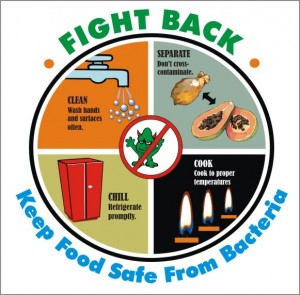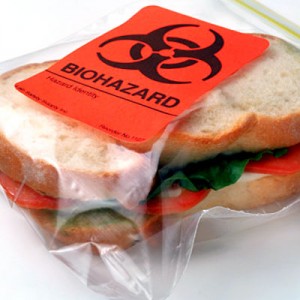Top 10 Ways To Prevent Food Poisoning

Food Poisoning, no it’s not the process in which someone literally puts poison into your food. If you’ve ever had food poisoning, you’ll know exactly how unpleasant it can be, even for a fit and healthy person. Sometimes food poisoning can cause serious illness and at times it’s fatal.
Most people assume that food poisoning comes from restaurants, cafes and fast food outlets only. Yes you can get food poisoning from all these places but you can also get food poisoning from your very own home cooking if you’re not careful about the way you handle your food and the cleanliness of your kitchen/cooking area.
People don’t like to admit that the germs might have come from their own home, but it’s a common myth to think that food poisoning only comes from a dodgy takeaway.
Follow these tips to reduce the risk of food poisoning in your home.
Wash your hands
Wash your hands thoroughly with soap and hot water for at least 30 seconds and dry them before handling food , after handling raw foods including meat, fish, eggs and vegetables, as well as after touching the bin, going to the toilet, blowing your nose, or touching animals, including pets. Wash your hands every single time before and after handling any type of food, be it raw or cooked.
Wash your counter-tops
Wash counter-tops before and after preparing food, particularly after they’ve been touched by raw meat, including poultry, raw eggs, fish and vegetables. You don’t need to use antibacterial sprays: hot soapy water is fine. Always have clean surface to work off of.
Wash dishcloths
Wash your dishcloths and tea towels regularly and let them dry before you use them again. Dirty, damp cloths are the perfect place for bacteria to breed and for germs to spread from dishes to you to your food.
Use separate chopping boards
Use separate chopping boards for raw food and ready-to-eat food. Raw foods can contain harmful bacteria that spreads very easily to anything they touch, including other foods, counter-tops, chopping boards and knives.
Keep raw meat separate
It’s especially important to keep raw meat away from ready-to-eat foods such as salads, fruit and bread. This is because these foods won’t be cooked before you eat them, so any bacteria that gets on to the foods won’t be killed.
Store meat on the bottom shelf
Always cover raw meat and store it on the bottom shelf of the fridge, where it can’t touch other foods or drip onto them. This prevents cross contamination from taking place in your refrigerator.
Cook food thoroughly
Cook food thoroughly and check that it’s piping hot all the way through. This is why it’s important to have a kitchen thermometer. Make sure poultry, pork, burgers, sausages and kebabs are cooked until steaming hot, with no pink meat inside.
Keep your fridge below 5°C
Keep your fridge temperature below 5°C. By keeping food cold, you stop food poisoning bugs from growing and breeding in your food.
Cool leftovers quickly
If you have cooked food that you’re not going to eat straight away, cool it as quickly as possible (within 90 minutes) and store it in the fridge or freezer.Always use any leftovers from the fridge within two days.
Respect ‘use-by’ dates
Don’t eat food that’s past its “use-by” date label. These are based on scientific tests that show how quickly harmful bugs can develop in the packaged food.
Again food poisoning can be fatal, it’s so easy for your kitchen to be cross contaminated if you don’t pay much attention to what goes on in your refrigerator.






